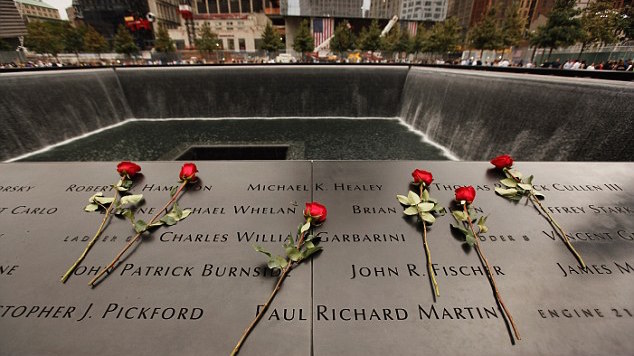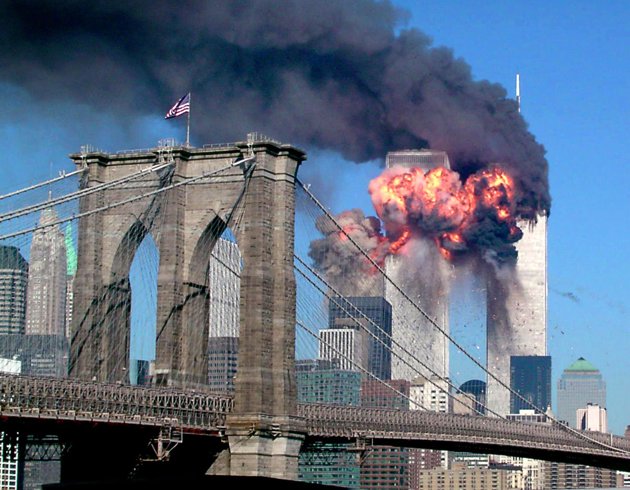Fifteen Years Later, 9/11 Victims Still Surviving
September 11, 2016
January 2002, he went on his first flight since surviving Sept. 11.
Brian and his wife, Cyndi, were scheduled to take a vacation to Puerto Rico. The night before their flight, Brian attempted to back down.
“If you don’t get on that plane tomorrow, you’ll never fly again,” Cy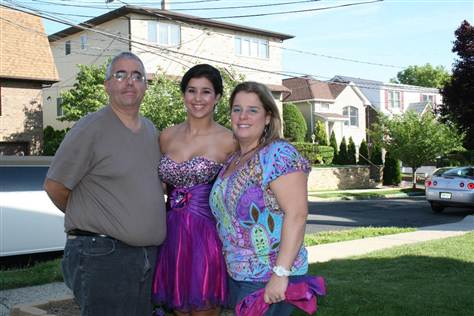 ndi warned.
ndi warned.
“Or maybe I will,” he thought for a second. “Probably not, but that’s a risk I think I’m willing to take,” he then quietly mumbled.
Surviving 9/11 was one thing, but willingly stepping foot on a plane after the fact was another.
After a sleepless night, they arrived at the airport completely exhausted.
It was nothing like it once was. Terror engulfed his mind and ran through his veins alongside the blood in his body.
He felt numb.
That feeling took the lead over every inch of his being as the memories began flooding back, drowning him, making him feel like the man he once saw drowning in the debris of what used to be the Twin Towers.
He gripped Cyndi’s shirt tightly, the veins in his arms beginning to bulge as he clung to her like a scared child would its mother on the first day of school. He refused to let her go because the last time he let someone out of his sight, that person burned until there was nothing remaining but ash and faint memories.
Every single person was searched head to toe and were required to walk through metal detectors, and finally had their bags scrutinized. There was absolutely no privacy whatsoever and no room for error.
Have a problem with that? Too bad.
There were men standing at every corner, gate, and hallway of the airport covered in bulletproof gear. They held machine guns, faces cold as stone, watching every single move.
Cyndi broke down and began crying, now in return grasping onto Brian as he held her close as they continued moving forward towards their gate.
Moving forward. Always moving forward.
A couple of hours later, they boarded the plane. Brian and his wife situated their belongings and then sat in their seats.
They both frantically looked around at all the people on the plane, watching every stranger board and move their personal belongings around. Hoping not to find anything out of the ordinary, they kept their eyes gazed upon everyone as the plane’s doors closed and locked.
Were they looking for just anyone acting outlandish? Or were they particularly on the lookout for Muslims? Probably Muslims. But they watched everyone and every movement anyway. There was the skinny blonde college student sitting in the seat in front of them, headphones stuck in her ears bobbing her head to the music and not paying any mind to the flight attendant speaking in the overhead microphone informing everyone where the emergency doors were located. And then there was the frantic 30-year-old mother sitting in the next row across from them desperately trying to calm her 3-year-old son who was pitching a fit because he too, like Brian, didn’t want to be in the plane.
The plane was packed full, the door was shut and locked, and the red seatbelt sign flashed on.
It was time to depart.
Both their hearts began pounding. Brian felt his anxiety skyrocket and his panic mode turned full steam.
Suddenly, the cockpit door opened and the pilot walked out. He stood in front of all the passengers, completely silent.
Not one person made a sound. The only thing heard was the breathing of the confused passengers.
The pilot continued to stand there, motionless. His face was lifeless, absolutely no expression.
He looked every passenger in the eye as if to say, “You better not try anything stupid. This plane is landing safely in Puerto Rico.”
The stewardess spoke up.
“If anyone in this plane gets up…”
Brian cut in to finish her sentence.
“If anyone in this plane gets up and tries to go into that cockpit, I’ll (expletive) kill you.”
And he was serious.
‘A Beautiful Day’
Although the Sept. 11th terrorist attacks were the largest human-made disaster in U.S. history, there is little existing research documenting the attacks’ consequences among those most directly affected, notably persons who were in the World Trade Center towers.
Data from a cross-sectional survey conducted two to three years after the attacks determined the occurrence of long-term, disaster-related post-traumatic stress symptoms and post-traumatic stress disorder (PTSD) in 3,271 civilians who evacuated both North and South W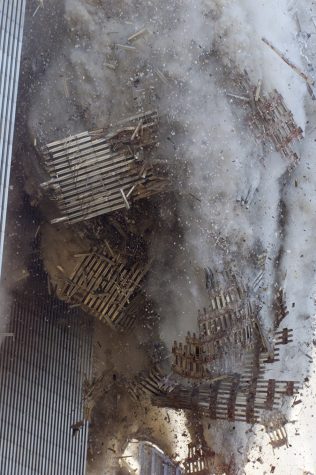 orld Trade Center towers. Overall, 95.6 percent of survivors reported at least one current post-traumatic stress symptom. Women and minorities were at an increased risk of PTSD.
orld Trade Center towers. Overall, 95.6 percent of survivors reported at least one current post-traumatic stress symptom. Women and minorities were at an increased risk of PTSD.
PTSD is a psychiatric disorder that occurs after experiencing or witnessing events that threaten death or serious injury and that involves intense feelings of fear, helplessness, or horror.
Five characteristics of direct exposure to the terrorist attacks independently predicted PTSD: being on a high floor in the towers, initiating evacuation late, being caught in the dust cloud that resulted from the tower collapses, personally witnessing horror, and sustaining an injury.
The rates of 9/11-related PTSD declined over time, though research can’t specifically say a time period. Those with the highest exposure burden experienced the worst mental health, according to Dr. Laura DiGrande, Division of Environmental Health, New York City Department of Health and Mental Hygiene.
***
It was a beautiful day, sunny without a cloud in sight.
Brian rode the ferry to work that day because the Holland Tunnel was completely backed up with traffic. He got to work at 8 a.m. and sat down at his desk on the 78th floor of the South Tower.
An hour later, he felt a rumble.
“The air conditioning in the office was turning on,” he thought. “Wait, no. That is not the air conditioning turning on. The air conditioning unit must have exploded.”
He continued with his work, certain that it was nothing serious.
Suddenly, thousands of papers began flying around the office. He looked outside and there too, papers were floating like snowflakes drifting from the sky.
People began panicking.
He stood up from his desk, grabbed his palm pilot, and walked to the office lobby to see what the commotion was all about.
Nothing.
He walked towards the elevator in attempt to go find out what the hectic worry was all for.
There were loud voices. He turned his head and watched as a human chain of women pushed themselves fiercely through the mobs of people on his floor, trying to get to the elevator.
The elevator doors opened.
There was chaos. Complete chaos inside the doors.
Elevator down, to ground one.
There were masses of people packed into the elevator that no one else could fit. But he made it in. The doors closed and the elevator moved downward.
Everyone was shrieking in complete panic and horror at the thought of not making it out alive.
“Why is everyone panicking?” Brian thought.
“Open the door! Push the door open!” someone yelled from inside the elevator. The doors opened and people hastily exited the elevator, pushing each other with no regard.
The security guards were standing outside
the elevator doors directing people in the calmest order possible. He looked to the left, then to the right. Again, there were thousands of pieces of paper still flying around. The lobby was going up in smoke. Dust and debris were everywhere.
Brian followed the security guard’s orders and continued moving forward in everyone else’s footsteps through a set of doors. There were yet again more security guards blocking certain routes, so everyone had no option but to go right.
He just kept following the crowd.
“Get out! Everybody out now!” officers yelled.
Now Brian wasn’t so composed.
Something was wrong.
Panic. Desperation. Fear. Confusion. Memory loss.
It was indeed a beautiful day. A beautiful day for a terrorist attack.
‘Why Steve?’
“Why am I here? Why did I get out and not him?” Brian continues to wonder.
On that treacherous day, Brian left someone behind. Steve.
Steve was one of Brian’s co-workers but also one of his closest friends.
“His death has haunted me for years,” Brian utters with emotions taking over his face.
He blamed himself for not making Steve leave the tower with him.
“A survivor experiencing guilt has to be one of the worst things in the world,” Brian says.
Years passed, and he never talked to Steve’s widow or kids. He didn’t know what to say.
“I’m sorry? I left your husband to die because he wouldn’t leave with me?” What do you say to your deceased best friend’s wife when you were the last person to see her husband before he stopped breathing from the fumes of smoke, got crushed by falling ceilings, and then burned to death?
But then one day, there was a ceremony held in New York City for a painting of all the people who died in the towers on Sept. 11. Brian knew they were coming and was surprisingly excited to see them. He walked into the ceremony and immediately saw a familiar face. It looked completely identical to that of Steve.
It was his son.
The boy’s mother walked up and looked at Brian. You could see the heartache in her eyes. The pain of seeing Brian standing next to Steve’s son was unbearable.
“It’s Stephen,” she said quietly in her shaken voice.
Steve’s father spoke up, “ What was so important that Steve didn’t leave?”
Brian didn’t say a word because truthfully, he had no idea.
***
While I listened to Brian tell me this story of Steve, my heart broke. I was as speechless as Brian was when Steve’s father asked him why his son didn’t leave.
A question that will forever remain unanswered, like so many that day. Maybe it’s a good thing. What answer would have have been sufficient?
After speaking with Brian and Cyndi, they took me to the 9/11 museum and showed me around. They volunteer. Many survivors do without sharing that information. Walking around the exhibit, I was chilled to realize how survivors were everywhere around me. Faceless.
Yet there was this one room filled with all the faces of the deceased that had once been recognizable. I found Steve’s face. He looked so young and happy in that picture on the wall. But there were countless faces not shown because there were so many bodies that had instantly turned to ash that day. Gray squares were set in place on the wall to represent the unknown bodies that had never been identified.
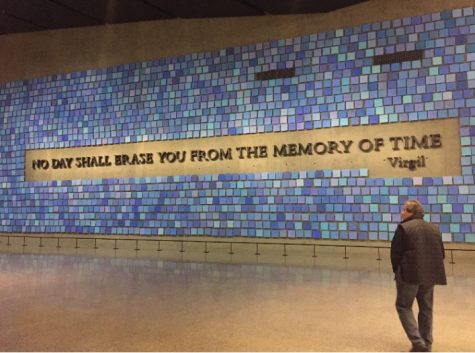
Within this room was another room set up as a little movie theater. It played messages from family members and friends and showed pictures of the person whom they had lost.
Cyndi played Steve’s for me. His wife spoke about what a great man he was: a great father, son and husband. There were pictures of him with his children.
As soon as I heard the voice of Steve’s wife begin over the speaker, I could no longer control my emotions. Tears streamed down my face and I felt nothing but pain. As a reporter, we aren’t supposed to let our emotions get the best of us and instead are supposed to empathize but keep our personal feelings out of it. But I couldn’t. Her voice was sad and full of emptiness. She made me feel lonely and lost, just like her.
“Why Steve? Why Brian?” I thought.
‘The Reflection Pool’
Every year on Sept. 11 in Battery Park City, New York, blue tribute lights are lit up 4,000 feet into the sky to represent the towers that once stood tall.
One evening, Brian and Cyndi were walking by the lights and a group of young ladies nearby wanted to take a picture in front of the blue lights.
They asked Brian to take their picture.
“Are you (expletive) kidding me? No!”
The ladies were taken back by his response, and their reaction turned into anger.
“You know, we were affected by this too,” one lady snarls back.
“Really?” He sarcastically continues, “Well I was on the 78th floor. Impact one. You weren’t affected.”
The young women stared wide-eyed into his, like deer caught in headlights.
“People don’t respect this sacred ground and meaning,” Brian states.
When Brian and Cyndi took me to the 9/11 museum, we stopped by one of the two reflection pools to see Steve’s name engraved in it.
As we silently stood there, and I let my fingers caress the engraved letters making up his full name, I heard Cyndi angrily speak up.
“Can you please take your child off this ledge? This is a gravesite for the people lost.”
The woman took her child off and agitatedly answered back.
“You don’t have to be rude about it,” she snarls.
Brian jumped in, “She isn’t being rude, but this is a gravesite and you need to respect that. I am a survivor of Sept. 11, and I knew some of these people. Please respect that.”
The woman looked at him in fear and astonishment. She hurried away.
“People don’t understand the meaning of ‘Reflection Pool’. This is the only gravesite they can come to in memory of their loved one(s),” Cyndi said to me.
I stared into it, my mind uncertain. I could not comprehend such a thought.
‘The Nightmare Still Lingers’
Merryl Wiener, sixty years old, sits on the subway trapped underground, though the train is still moving.
It stops.
The doors open and people flood in.
Panic strikes her face as her breathing doubles and her anxiety strikes.
“Breathe in, breathe out. In. Out. In. Out,” she thinks to herself.
Merryl looks around in every direction possible as she profiles every Middle Eastern looking man, woman and child.
She saw one and panicked. Almost getting up and running out of the train, she realized the doors had already closed and the subway was moving forward again.
“Is he going to blow up my train?”
Flashes of Sept. 11 flood back into her memory, and she closes her eyes hoping that the next time she opens them, the subway doors will be opened and she can run.
I called Merryl at 8:30 p.m. to talk about her experience surviving Sept. 11. She told me that she didn’t like to talk to people face to face.
She apologized for taking a little longer to get home for our call and had just gotten home from work at Corporation Service Company. But she had only been five minutes late for our scheduled call.
As soon as I got on the phone with her, I made sure she knew I was sympathetic towards her feelings and if there was anything she felt uncomfortable saying, that she didn’t have to tell me. It’s her story, after all.
“Talking to you about this is my therapy,” she said back to me. “I will be a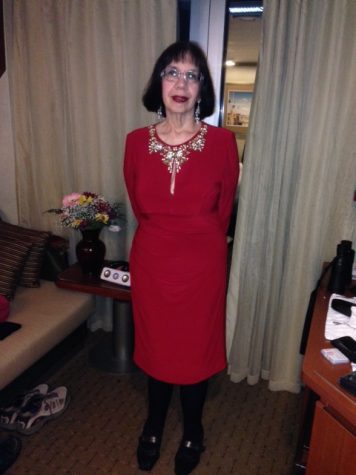 ble to relax and sleep tonight because of you.”
ble to relax and sleep tonight because of you.”
She is not in front of me, and that is as close to a hug as we will ever get. But it is a warm hug. We both needed to hear those words.
**
Every year on Sept. 11, Merryl wakes up and looks out her window. She hopes that it’s a cloudy, rainy day.
“On Sept. 11, it was an absolutely beautiful day out. It was warm. Not a cloud in sight. I cannot face another Sept. 11 day looking like that.”
Merryl worked on the South Tower, 87th floor, just two floors above the impact zone.
She had stopped to get Mamma Mia tickets in the city on her way to work. Soon after she arrived at work, she smelled ignition fuel. The building shook but most people would not leave the floor.
“People wouldn’t leave because they thought they would lose their job. Our superiors told us it was nothing and to stay, so we didn’t think it was any emergency,” Merryl said.
Merryl decided to leave anyway and took the nearest staircase.
“The staircases should have been packed but weren’t because so many people stayed behind because they were told everything was fine.”
A lot of people died on her floor, along with her cousin, John, who worked in the same building.
“We didn’t even get a bone of his body to bury. There was nothing left of him,” Merryl sadly whispers over the phone.
It took Merryl twenty-five minutes to get out of the South Tower and into the streets. That is when she knew at least one plane had hit a tower.
“There was so much smoke, I couldn’t tell which tower had been hit.” She continues on, “There was another plane in sight. It looked like a big eagle, disoriented.”
The streets were packed with frantic people running in every direction, screaming and crying.
“The ground rumbled as if we were experiencing an earthquake except worse. It felt like the earth was just giving away right beneath our feet.”
Merryl started running while stumbling over piles of debris, as if she were running up and down sand dunes in the desert, her feet drowning in the soil. But she continued hopeful she was running in the right direction. More and more smoke collected, taking over the entire city’s face. Dust and debris filled the air making it harder for her to see and even harder for her to breathe. She looked down at her feet as she ran because it was the only thing she could see and even then, it was like standing in the middle of a hurricane, tornado and earthquake whirling at the same time. Still not knowing which direction she was headed, she kept going. She could barely make out any person running within a foot of her because they were completely disguised in the dust and debris from the buildings and smoke.
She made it to what seemed to be Brooklyn, and there she stopped and turned around for the first time.
“It was hell. I swore I was staring into hell.”
She stopped and found a payphone, shuffled through her pant pockets for a few quarters, and called her son and frantically told him she was in Brooklyn and he needed to meet her.
She hung up the payphone and felt a shiver throughout her body.
“I hung up that phone and then realized that there was a chance I would never see my son again. That could have been the last time I ever heard his voice.”
While Merryl was searching for her son, she came across a lady who had been on her way to chemotherapy before the towers hit.
“If she can make it to her therapy, I’ll make it to my son,” she thought.
It took her a year and a half to go see Mamma Mia after that grim day. But it took her even longer to go back to the site of sheer hell.
Merryl went to the 9/11 museum when it first opened up because survivors were allowed to go for free.
As soon as she walked in, she saw people taking family photos and selfies all throughout the museum.
“It’s hallow ground,” Merryl angrily said. “They disgust me.”
She never stepped foot back.
‘One Word: Terrorism’
Merryl and Brian have coped with this tragedy in similar yet different ways.
Merryl tried group therapy. She made a commitment and said she would give it a try but never lived up to that commitment. She has her own way of coping, and speaking to interested people about her experience is how she moves forward.
Brian also feels that speaking to people and informing them of that damned day has helped him. He has also made a commitment to consistently volunteer at the September 11 museum every Sunday with Cyndi.
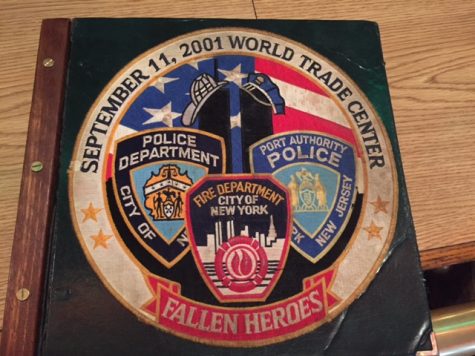
“What are you going to do? You have to move forward. You have to cope, and there’s no wrong way to cope as long as it’s not going to harm someone,” Merryl states.
They realize it is a feeling that will never go away. The previous generation had Pearl Harbor. This generation has 9/11.
“When I think of Sept. 11, there’s one word that comes to mind: Terrorism. I see Bin Laden’s face,” Merryl says.
Merryl’s mother was in her older years, and knew she was going to die soon.
“My mother wouldn’t allow herself to die. She held on for one reason: to watch Bin Laden get caught. She would not die in peace until she knew I could live in peace.”
That day came on May 2 of 2011 when Merryl and her mother were watching the news. President Barack Obama went on air and told the world that Osama Bin Laden had been found and confined.
Later that night, Merryl’s mother took her last breath.
**
To survive such a day is heroic to many of us who can’t comprehend what it was really like.
“I feel like a celebrity sometimes because people are so curious about my life and how I survived,” Merryl says, wishing she wasn’t compared to anyone famous.
She doesn’t want to be famous. Never did. She says she feels deteriorated now. But at the same time, she has changed, re-shaped herself and her life.
“I appreciate so much more in life like snow, flowers and smiling,” she says to me in a light toned voice.
Merryl and Brian are at peace with the fact that they won’t ever be the persons they used to be.
“It’s okay to be who I am now,” Brian says to me as his wife looks at him in agreement.
“I am very lucky to have been given these past fourteen years of life after 9/11. Yes, I still feel survivor guilt, and no, I am not as emotionally strong as I want to be,” Merryl states. “But I’m fortunate to be here still. I’m fortunate to have survived.”
‘I Am A Survivor’
What is the definition of a survivor?
One definition says: “A person who continues to function or prosper in spite of opposition, hardships, or setbacks.”
Another states: “A person who survives, especially a person remaining alive after an event in which others have died.”
So how can one really define who survived Sept. 11?
Were the survivors just the people who were in the towers when the planes hit? Were survivors all the people who
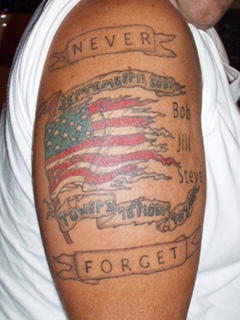
survived within fifty miles of the crash? Maybe survivors were those living in New York or Washington D.C. on the day of the Pentagon and Twin Tower attacks.
Or maybe a survivor is one thing and just being affected by terrorism is something else.
But ultimately, one cannot put such a distinct description on what a survivor is.
Brian is most definitely a survivor. Meryl is also without a doubt a survivor.
Any man or woman who made it out of those Twin Towers is the ultimate definition of a survivor. The families and friends they left behind, who mourn for them and miss their voices, they are survivors too.
**
Merryl told me to listen to a song called I am Woman.
She quoted the song while including her own lyrics: “I cry and in-between I roar.”
Later she told me, “It’s okay that I’m not okay.” And of course, I agreed. “You’re right. It is okay that you’re not okay.”
To quote I am Woman: “Yes, I am wise, but it’s wisdom born of pain. Yes, I’ve paid the price, but look how much I’ve gained. If I have to, I can do anything. I am strong. I am invincible. I am woman.”
“I am a survivor,” Brian powerfully declares.
Merryl vigorously adds, “And I’m still surviving.”

